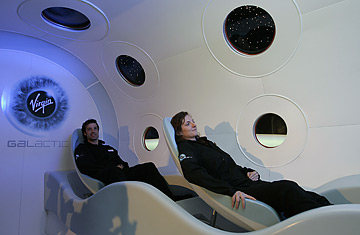
A mock-up of the cabin of the Virgin Galactic Spaceship Two is seen on display at the Science Museum in London, February 14, 2007.
Mark, 53, and Christine, 45, are typical of the first group — dubbed The Founders — who have plunked down $200,000 each to fly into space with Galactic, which hopes to begin operations by 2009. (Branson is still taking deposits of $100,000 to $175,000 for travelers who want to go during the first year.) About a dozen of the aspiring astronauts gathered late November on Necker Island, the private island owned by Virgin Galactic's boss, Richard Branson, in the British Virgin Islands. I went expecting to meet a bunch of Richie Rich types just looking for a thrill ride. Instead, I found a group of hardy pioneers, millionaires sure, but idealists who dreamed as kids of going into space. Mark, for instance, grew up during the Apollo years, but got rich from an IPO of his software-mapping firm. Now he's back to his first love. "It's not the thrill of acceleration for me," he says. "It's the experience of looking down to see the Earth, the experience of zero gravity. It would be crazy not to do it."
"It's gonna be simpler than I thought," agrees Ed Holliday, a 62-year-old hedge fund wholesaler from Laguna Niguel, California. "We're not required to be astronauts, like Steve Austin, the Six Million Dollar Man." Actually, it's a two-way street. Virgin Galactic must find out before blast-off how people in their 50s, 60s and 70s — those most able to afford it — can cope with the stress of space travel. "To be commercial viable and safe, we need data on the way people react to g forces and the psychological experience of going into space. We don't know that yet," says Alex Tai, Galactic's chief of operations — and the man who will pilot first Virgin's first spaceship. One possibility is a ride in a centrifuge to see how passengers will react to the g forces. For now, however, there aren't a lot of requirements other than deep pockets.
A number of the Founders were struck at how open Branson and the legendary aircraft designer Burt Rutan have been, inviting them to Rutan's closed shop out in the Mojave Desert, to the Virgin Galactic launch in New York, and yes, to Branson's private island. "Richard can carry on research until 2012 as far as I'm concerned. It's such fun," says John Goodwin, a 62-year-old retired candy wholesaler from England, who talked while his fellow travelers played tennis in the rain. Goodwin had visited Rutan's workshop. "There he is, answering your questions. We've got these seats here, he says. How do YOU want them? I didn't realize when we come back from space, we're going to be hitting over 6 gs — six times our body weight. You can't be sitting upright. You'd black out. You've got to lie down and Rutan's designed a seat to achieve that objective."
Safety is paramount for the new industry. The space pioneers know they are on borrowed time. In 2004 President Bush signed a law that basically gives them until 2012 to establish standards without the onerous rule-making of the 70-year-old airline industry. This month, the Federal Aviation Administration will issue guidelines for crew and passengers on spaceships. One bad accident and the door to space could be slammed shut. Rutan notes that the risk of dying on early planes was one in 6,000. Today, it's one in several million. He's not going to fly until he's sure today's spaceships are as safe as early planes, he says. "This isn't something for crazy avant-garde adventurers. This is not an Everest climb. I don't think Richard Branson would be comfortable thinking this is a long shot because he is already selling tickets."
Many of the Founders, in fact, trace their desire to go into space to Neil Armstrong's walk on the moon in 1969. P.J. King was a kid, living in western Ireland, admiring the sky one night when his older brother started pointing out Orion and the constellations. "I said that's cool. We should go there. And my big brother says, you can't go there! I was angry and yelled, 'But I saw it on TV! They went to the moon'." Now 38 and living in Dublin, he laughs at the memory, but feels bad about not using his degree in astronautics and space engineering. "Next October will be 50 years since Sputnik went up," he says in disgust. "This is not just an opportunity to send people 100 or so kilometers (62 miles) into the sky and to have a good time for 10 minutes for a lot of money," he says. "If we get it right, it will be the start of something extraordinary. It will open the gateway to a lot of innovation in space travel."
The Founders have, in fact, become quite "evangelical" about space, says Londoner Trevor Beattie, a self-described "space nut" who has a scrapbook from his youth of the Armstrong's moon walk and the Apollo 13. "You'll get a sense of wonderment from everybody here," says the 47-year-old ad man. "You've got a bunch of believers who are going to make this happen. It's a lifelong dream for people." David Horowitz, a 55-year-old investment manager from Irvine, California, couldn't agree more. "It's changed me. We're doing things we should have been doing 40 years ago in space. That's Burt's vision and Richard's vision — get a bunch of people up there and the perception will change."
